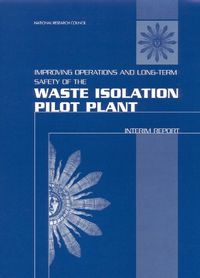
Improving Operations and Long-Term Safety of the Waste Isolation Pilot Plant
The National Research Council convened a committee of experts to advise the U.S. Department of Energy (DOE) on the operation of the Waste Isolation Pilot Plant (WIPP), a geologic repository for disposal of defense transuranic (TRU) waste near Carlsbad, New Mexico. The committee was asked to provide recommendations on the following two issues: (1) a research agenda to enhance confidence in the long-term performance of WIPP; and (2) increasing the throughput, efficiency, and cost-benefit without compromising safety of the National TRU Program for characterizing, certifying, packaging, and shipping waste to WIPP.
The committee has written this interim report to provide DOE with recommendations on several issues that the committee believes merit immediate consideration and action. In developing this report, the committee has been guided by the principle of "reasonableness" with respect to risks, costs, and the ALARA (as low as reasonably achievable) principle. In the committee's judgment, implementing the recommendations contained in this report will contribute to the continued safe operation of WIPP.
Table of Contents
Front MatterSummaryIntroductionBaseline Radiogenic Analysis of Subsurface FluidsTransuranic Waste Management ProgramReferencesAppendix A: Background InformationAppendix B: Joint USNRC and EPA Guidance on Mixed WasteAppendix C: Biographical Sketches of Committee MembersAppendix D: Acronyms
Utgiven: 2000
ISBN: 9780309069281
Förlag: National Academies Press
Format: Häftad
Språk: Engelska
Sidor: 56 st
The National Research Council convened a committee of experts to advise the U.S. Department of Energy (DOE) on the operation of the Waste Isolation Pilot Plant (WIPP), a geologic repository for disposal of defense transuranic (TRU) waste near Carlsbad, New Mexico. The committee was asked to provide recommendations on the following two issues: (1) a research agenda to enhance confidence in the long-term performance of WIPP; and (2) increasing the throughput, efficiency, and cost-benefit without compromising safety of the National TRU Program for characterizing, certifying, packaging, and shipping waste to WIPP.
The committee has written this interim report to provide DOE with recommendations on several issues that the committee believes merit immediate consideration and action. In developing this report, the committee has been guided by the principle of "reasonableness" with respect to risks, costs, and the ALARA (as low as reasonably achievable) principle. In the committee's judgment, implementing the recommendations contained in this report will contribute to the continued safe operation of WIPP.
Table of Contents
Front MatterSummaryIntroductionBaseline Radiogenic Analysis of Subsurface FluidsTransuranic Waste Management ProgramReferencesAppendix A: Background InformationAppendix B: Joint USNRC and EPA Guidance on Mixed WasteAppendix C: Biographical Sketches of Committee MembersAppendix D: Acronyms
Begagnad bok (0 st)
Varje vecka tillkommer tusentals nya säljare. Bevaka boken så får du meddelande när den finns tillgänglig igen.



